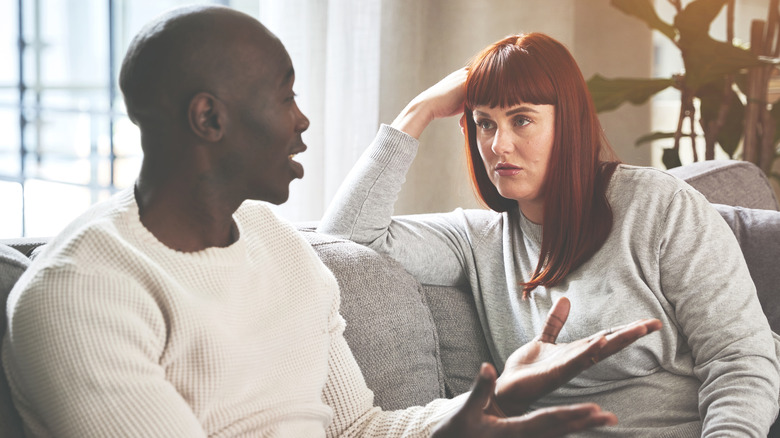Why It's So Healthy To Recognize (And Accept) Your Red Flags
No one is perfect. That goes without saying. However, some people fail to see themselves as they truly are: imperfect human beings sharing the world with other imperfect human beings. Knowing and accepting your shortcomings, what you should work on, and how your actions are perceived and affect people around you takes a lot of self-awareness. It means digging deep inside yourself and realizing that although you have green flags, you also have red flags too — and the latter of which is a very healthy thing to identify.
"In effect, self-awareness is the recognition of one's own emotional state at any given point in time," clinical psychologist and author John Duffy tells NBC News. "The argument suggests that we are, far too often, wholly unaware of the emotional state we are currently in, and the degree to which that state influences our behavior and thought process. To the degree that we can manage our emotional states, we are better able to manage these other elements of our lives as well."
Recognizing our red flags is the epitome of self-awareness. When we can call out ourselves for weaknesses and personality flaws, we open up a whole world of knowledge about who and what we are. And we learn how to manage the things we do that might negatively impact others and ourselves. So stop hiding from the truth — we all have red flags. What's important is that we recognize them and accept them. Here's why.
It makes you more empathetic
When you can recognize your own red flags, you're able to step outside yourself and into someone else's skin and see things from their perspective. This is a character trait that everyone should, ideally, have by a certain age. Yet, some are still hobbling to get there and some never will because self-delusion can be a tough mentality to shake.
According to a 2016 study published in Europe's Journal of Psychology, those who are self-aware have a deeper understanding of themselves, as well as a greater appreciation and acceptance of others. In other words, seeing your authentic self and all you are — the pros and cons — results in your ability to empathize with others. You can open yourself up to their struggles and feel them on a human level which is a very important capacity to have.
"Empathy is the ability to feel intimately and see the other person's perspective," therapist Habiba Zaman, LPC, NCC tells Mind Body Green. "It is not just to understand what they are going through but rather, being able to walk in the other person's shoes. It is being able to say, 'I am here to feel with you' and let you know you are not alone." When you're able to emphasize, you embrace your emotional vulnerability and you can see how your behavior — your red flags — affects everyone with whom you come into contact. It makes you more reasonable and forgiving of others and yourself.
It makes you better at communicating
No matter where you go in life, you have to communicate. Whether it's with family and friends, coworkers, or the person behind the cash register at the grocery store, communicating is part of being human. Maybe none of your red flags are directly related to interacting with people. But knowing these aspects about yourself will help you engage with others better because you're aware of the parts of you that need some work. Being able to communicate well is an acquired skill and not something that many people are just naturally born with.
"Effective communication is more than just conveying a message. It focuses on the exchange of ideas to improve relationships and interactions," relationship psychologist Mairéad Malloy tells PsychCentral. "It's about how we give and take verbally and nonverbally, back and forth, engaging and sharing ideas."
In order to properly have a meaningful dialogue, one needs to be aware of themselves. Casually talking and communicating are two different things. Anyone can do the former, but only those who are self-aware can do the latter.
It strengthens relationships
To no major surprise, when you've mastered communication and are able to empathize, your relationships are better for it. Not just romantic relationships, but the ones you have with friends and family too. You can show up wholly because you're aware of what you're able to offer and accept.
"A lack of self-awareness affects our relationships a great deal," psychologist Dr. Tasha Eurich tells Bustle. "Researchers have found that one in four people has emotionally distant personal relationships because of their bullish views of their personality and behavior. Without a doubt, when we take charge of our own self-awareness, almost anyone can make remarkable improvements."
Once you pull back the veil on yourself and realize you're actually not all that you thought you were, allowing your weaknesses and flaws to come into view, your relationships with others will be stronger because they will be more genuine and honest. You won't be holding anything back and that's essential for healthy relationships.
It improves you emotional and mental health
As the 2016 study also found, the more self-aware the participants were, the greater their ability to act in a certain way that was appropriate for a situation and they could identify in themselves where they needed to make improvements. Although some of the participants came out of the study more self-critical and questioned their past behavior, this isn't necessarily a bad thing.
Self-criticism can lead people to have healthier beliefs about themselves and the world around them. It can also make them more aware of when and how to step up to the plate for others, and it creates a longing to grow and ultimately do better. But too much of it can backfire and take a dark path. It's one thing to acknowledge your red flags and take accountability for your behavior, but it's another thing to get overly down on yourself for that behavior.
One of the most important things that comes with recognizing your red flags is accepting them. Do you struggle to set boundaries? Accept it and work on it. Do you don't stand up for yourself when you should? Accept it, then do something about it. Because we're all works in progress wandering around this world, none of our red flags are set in stone. People can evolve, learn from errors and mistakes, and process that information to lessen the number of red flags they have.




